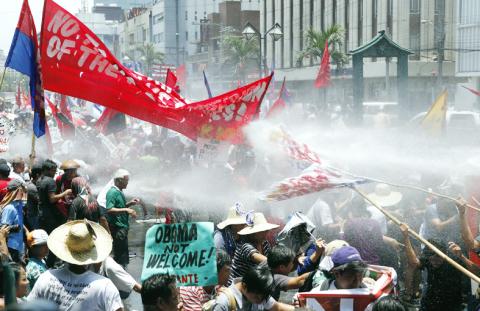US President Barack Obama yesterday ended an Asian tour with a warning to China against using force in territorial disputes, as Chinese authorities accused the US president of ganging up with “troublemaking” allies.
The barbs ensured a tense finish to a four-nation trip dominated by the worsening maritime rows between China and US allies in the region.
“We believe that nations and peoples have the right to live in security and peace, to have their sovereignty and territorial integrity respected,” Obama told a gathering of US and Philippine troops in Manila. “We believe that international law must be upheld, that freedom of navigation must be preserved and commerce must not be impeded. We believe that disputes must be resolved peacefully and not by intimidation or force.”

Photo: AFP
The Philippines has been embroiled in one of the highest-profile territorial disputes with China, over tiny islets and reefs in the South China Sea. Beijing claims nearly all of the South China Sea.
The Philippines and the US signed an agreement on Monday that will allow a greater US military presence on Philippine bases.
Obama yesterday sought to reassure the Philippines that the US would back its ally in the event it was attacked, citing a 1951 mutual defense treaty.

Photo: Reuters
“This treaty means our two nations pledge, and I am quoting, ‘Our common determination to defend themselves from external armed attacks,’” Obama said.
“And no potential aggressor can be under the illusion that either of them stands alone. In other words, our commitment to defend the Philippines is ironclad,” he said.
Nevertheless, Obama did not specifically mention coming to the aid of Manila if there was a conflict over the contested South China Sea areas, as his hosts had hoped.
While offering pledges of protection to Tokyo and Manila, Obama also insisted the US was not seeking to counter or contain China.
Nevertheless, an editorial in the state-run China Daily yesterday signaled Chinese authorities viewed Obama’s trip as a tour of anti-Chinese hostility.
“It is increasingly obvious that Washington is taking Beijing as an opponent,” the editorial said.
“With Obama reassuring the US allies of protection in any conflict with China, it is now clear that Washington is no longer bothering to conceal its attempt to contain China’s influence in the region,” the editorial said.
The editorial warned against believing Obama’s “sweet promises” of a new, constructive relationship between the US and China, and instead outlined what it described as a “grim geopolitical reality.”
“Ganging up with its troublemaking allies, the US is presenting itself as a security threat to China,” the editorial said.

The US government has signed defense cooperation agreements with Japan and the Philippines to boost the deterrence capabilities of countries in the first island chain, a report by the National Security Bureau (NSB) showed. The main countries on the first island chain include the two nations and Taiwan. The bureau is to present the report at a meeting of the legislature’s Foreign Affairs and National Defense Committee tomorrow. The US military has deployed Typhon missile systems to Japan’s Yamaguchi Prefecture and Zambales province in the Philippines during their joint military exercises. It has also installed NMESIS anti-ship systems in Japan’s Okinawa

‘WIN-WIN’: The Philippines, and central and eastern European countries are important potential drone cooperation partners, Minister of Foreign Affairs Lin Chia-lung said Minister of Foreign Affairs Lin Chia-lung (林佳龍) in an interview published yesterday confirmed that there are joint ventures between Taiwan and Poland in the drone industry. Lin made the remark in an exclusive interview with the Chinese-language Liberty Times (the Taipei Times’ sister paper). The government-backed Taiwan Excellence Drone International Business Opportunities Alliance and the Polish Chamber of Unmanned Systems on Wednesday last week signed a memorandum of understanding in Poland to develop a “non-China” supply chain for drones and work together on key technologies. Asked if Taiwan prioritized Poland among central and eastern European countries in drone collaboration, Lin

Renewed border fighting between Thailand and Cambodia showed no signs of abating yesterday, leaving hundreds of thousands of displaced people in both countries living in strained conditions as more flooded into temporary shelters. Reporters on the Thai side of the border heard sounds of outgoing, indirect fire yesterday. About 400,000 people have been evacuated from affected areas in Thailand and about 700 schools closed while fighting was ongoing in four border provinces, said Thai Rear Admiral Surasant Kongsiri, a spokesman for the military. Cambodia evacuated more than 127,000 villagers and closed hundreds of schools, the Thai Ministry of Defense said. Thailand’s military announced that

CABINET APPROVAL: People seeking assisted reproduction must be assessed to determine whether they would be adequate parents, the planned changes say Proposed amendments to the Assisted Reproduction Act (人工生殖法) advanced yesterday by the Executive Yuan would grant married lesbian couples and single women access to legal assisted reproductive services. The proposed revisions are “based on the fundamental principle of respecting women’s reproductive autonomy,” Cabinet spokesperson Michelle Lee (李慧芝) quoted Vice Premier Cheng Li-chiun (鄭麗君), who presided over a Cabinet meeting earlier yesterday, as saying at the briefing. The draft amendment would be submitted to the legislature for review. The Ministry of Health and Welfare, which proposed the amendments, said that experts on children’s rights, gender equality, law and medicine attended cross-disciplinary meetings, adding that